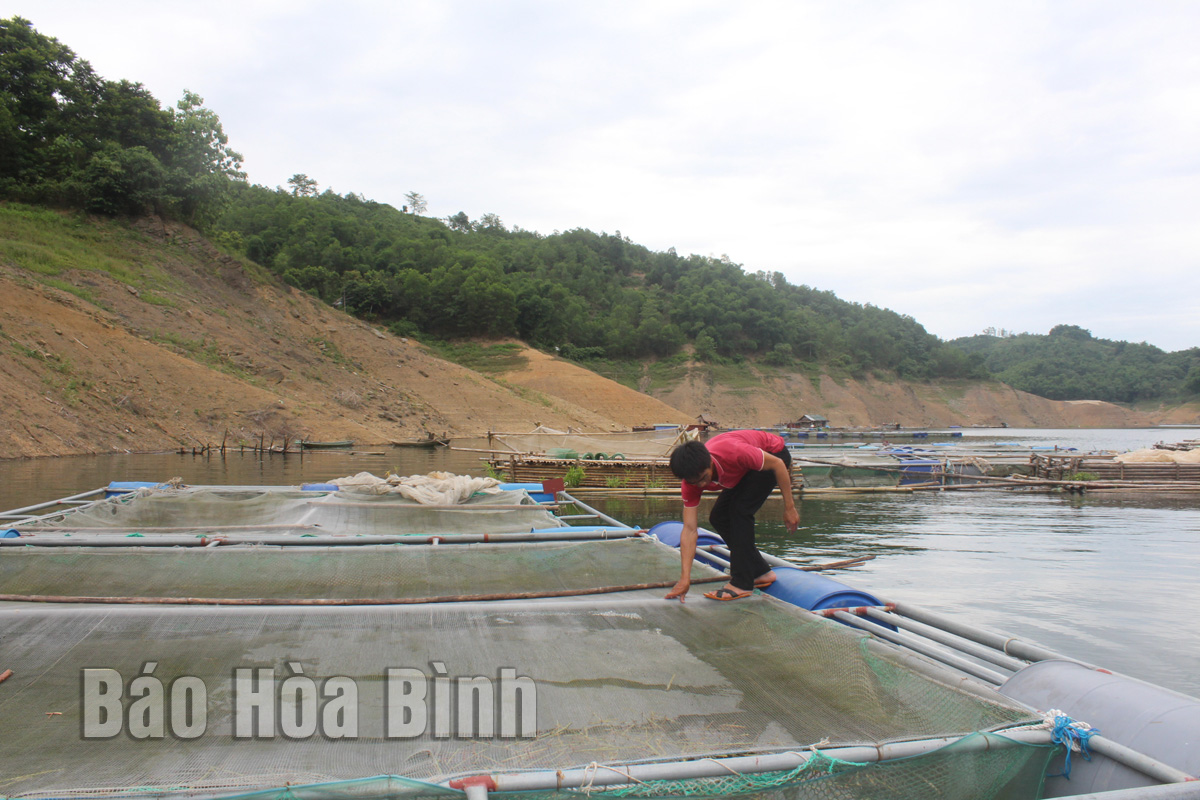
(HBO) – Hoa Binh province boasts considerably potential for developing fisheries as it is home to over 14,460ha of pond, lake, irrigation work, and hydropower reservoir surface, along with some river and big streams that can be used for cage fish farming or fishing. Notably, the Hoa Binh hydropower reservoir is considered a precious treasure of fishery resources in the northwestern region.

Residents in Ne village of Suoi Hoa commune (Tan Lac
district) are developing cage fish farming as a source of livelihood.
To tap into existing potential and advantages,
preserve and develop fishery resources, and create stable livelihoods to
improve living standards for residents near the Da River reservoir, over the
past years, the provincial Department of Agriculture and Rural Development has
pushed ahead with restructuring the fisheries sector in a way that increases
cage farming in particular and aquaculture in general.
Authorities have been working to expand the cage
farming of quality and high-value fish species on local rivers and large lakes,
especially the Hoa Binh hydropower reservoir, with advanced aquacultural
technologies applied. They have boosted upgrading fish fry production
establishments, disseminating the Law on Fisheries, monitoring exploitation
activities so as to detect and deal with any wrongdoings in a timely manner,
conserving aquatic biodiversity and the environment, and recovering fishery
resources in river basins and lakes.
For 2022, the province looks to maintain the
aquaculture area, raise the number of fish farming cages to 4,900, and record
12,000 tonnes in the total fishery output, including 10,000 tonnes from
aquaculture and 2,000 tonnes from fishing.
The fisheries sub-department reported that in
the first half of this year, Hoa Binh produced more than 26 million fish fries
while maintaining 2,700ha of water surface for aquaculture and 4,750 farming
cages. The aquaculture output stood at 5,199 tonnes, up 10% year on year.
Meanwhile, fishing mostly takes place on the Da River hydropower reservoir,
rivers, large streams, and lakes, harvesting an estimated 961 tonnes, rising 5%
from a year earlier.
Hoa Binh plans to develop the farming of
high-value fishery species, especially cage fish farming on large reservoirs,
to serve processing and export. It targets 3,000ha of water surface for
aquaculture, 5,500 farming cages, and over 15,000 tonnes in fishery output by
2025.
To achieve the targets, authorities are taking
measures for diversifying fishery species, encouraging the farming of new and
high-quality varieties that suit local conditions so as to improve productivity
and value, and expanding concentrated farming areas on the Da River reservoir.
They have also paid attention to food safety and VietGAP practices, origin
traceability, along with trade promotion./.
According to data from the Hoa Binh Provincial Party Committee, the industrial production index for the first six months of 2025 is estimated to have increased by 20% compared to the same period last year. This marks the highest year-on-year growth rate for this period since 2020.
In the first six months of 2025, Hoa Binh province’s export turnover was estimated at 1.145 billion USD, marking an 18.11% increase compared to the same period in 2024. Import turnover was estimated at $ 804 million, a 17.15% increase, which helped the province maintain a positive trade balance.
The lives of the ethnic minority farmers in Tan Lac district have gradually improved thanks to the new directions in agricultural production. This is a testament to the collective strength fostered through the professional associations and groups implemented by various levels of the district’s Farmers’ Union.
With the motto the "product quality comes first,” after nearly one year of establishment and operation, Muong village’s Clean Food Agricultural and Commercial Cooperative, located in Cau Hamlet, Hung Son Commune (Kim Boi district), has launched reputable, high-quality agricultural products to the market that are well-received by consumers. The products such as Muong village’s pork sausage, salt-cured chicken, and salt-cured pork hocks have gradually carved out a place in the market and they are on the path to obtaining the OCOP certification.
In the past, the phrase "bumper harvest, rock-bottom prices" was a familiar refrain for Vietnamese farmers engaged in fragmented, small-scale agriculture. But today, a new spirit is emerging across rural areas of Hoa Binh province - one of collaboration, organisation, and collective economic models that provide a stable foundation for production.
Maintaining growing area codes and packing facility codes in accordance with regulations is a mandatory requirement for agricultural products to be eligible for export. Recently, the Department of Agriculture and Environment of Hoa Binh province has intensified technical supervision of designated farming areas and packing facilities to safeguard the "green passport" that enables its products to access international markets.



